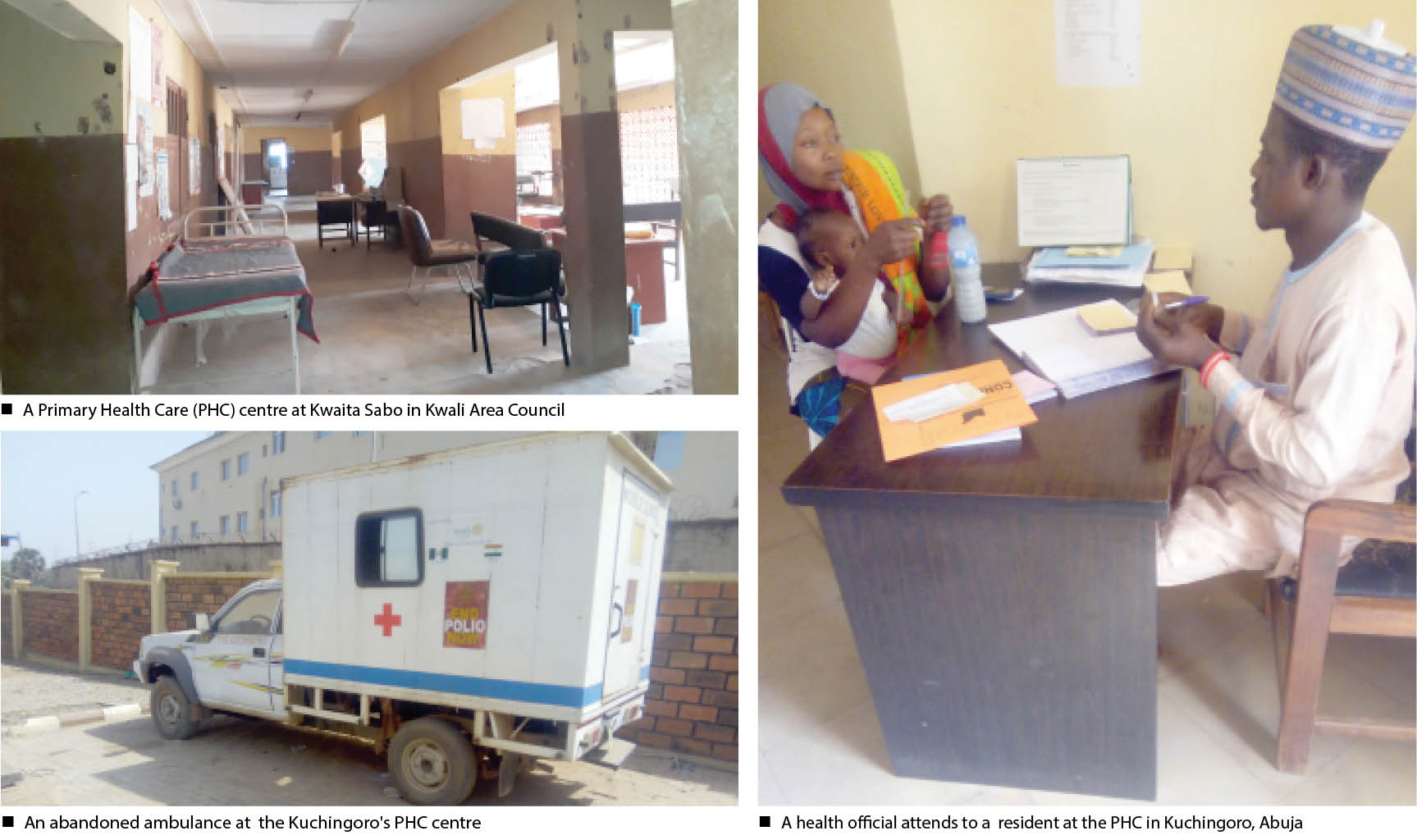- Lack drugs, manpower
Primary healthcare centres in the Federal Capital Territory (FCT) are in deplorable condition, Daily Trust investigation has revealed.
Most of the centres are poorly equipped and lack adequate manpower to cater to the healthcare needs of residents, especially those in rural areas.
The primary healthcare centres were set up mainly to augment the services of hospitals and clinics. But so far, many of them have fallen short of that mandate.
In the FCT, though there are 239 primary health centres, only 30 are equipped, an official told Daily Trust.

Some of the PHCs visited in Abuja Municipal and Kwali area councils, apart from being in a very poor state, were manned by Community Health Extension Workers (CHEW). Most of the facilities lack drugs, electricity, manpower and necessary equipment.
Our reporters observed that the centres also had very limited spaces to accommodate patients on admission, a development which forces officials to refer patients with complicated cases to other government-owned hospitals or private health facilities.
Daily Trust investigation showed that area councils are responsible for the funding of PHCs through their budgetary allocations.
However, efforts to get the budgets of the area councils were unsuccessful, as one of our reporters was referred to the annex office of Abuja Municipal Area Council (AMAC).
He was, however, unable to access the budget there.
Also, officials of Kuje and Gwagwalada area councils said they could not access the budgets either.
Pathetic situation in most health centres around the federal capital
At Kuchingoro primary healthcare centre, Daily Trust discovered that a doctor attends to more than 30 patients between 7am and noon. The centre, which was revitalised and made fully functional by the Federal Ministry of Health/National Primary Health Care Development Agency in collaboration with the Federal Capital Territory Administration/Abuja Municipal Area Council, still lacks adequate manpower and electricity.
The facility has nine health workers, but no resident doctor. The staff members include a chief medical laboratory scientist, midwife and laboratory technician.
A doctor, who was seen at the centre at the time Daily Trust visited, was on training from a private hospital. She said though there was some equipment at the centre, they lacked adequate manpower. She added that the person-in-charge of the centre also oversees several PHCs in the council. The young doctor said she had attended to more than 30 patients by noon when our reporter visited. Despite the figure she gave, our reporter counted seven other persons waiting to see her.
“I might not be able to attend to the next patient as I attended the first. In fact, the person in charge attended to more patients yesterday,” she said. Due to lack of electricity at the centre, the immunisation kits are kept in a solar-powered refrigerator.
“Once I come here, I leave with my phone’s battery flat because there is nowhere to charge and the ventilation is poor,” the doctor added.
The story is not any different at the PHC in Abaji town. The facility lacks adequate manpower, such as cleaners, doctors, and other health attendants. A staff who spoke on condition of anonymity said inadequate bed space and consumables were among major challenges at the health centre.
He said the centre has only one doctor, three nurses and one midwife, adding that the doctor was always under pressure due to the influx of patients from various communities seeking healthcare services.
“Sometimes the doctor travels for a workshop or some other assignment. During that period, the hospital remains without a doctor until he returns. Some patients have to be referred to other hospitals during such period,” he said.
Patients depend on corps member in Kwali
At the primary health care centre in Kwali, a staff said patients in the area depend on a NYSC member.
“We only have one doctor in this centre, and he came here as a corps member. He has finished his service, but he sometimes comes around to attend to patients,” he said.
He said the centre lacked ambulance, but that it has three nurses who attend to patients, especially pregnant women.
The primary health care centre in Kuje was no better. When Daily Trust visited, the centre was in a state of disrepair and lacked basic equipment.
It has only three-bed spaces, making it difficult for patients to be admitted. It was also observed that patients, especially pregnant women, had to queue for hours to see the doctor.
A staff at the centre told our reporter that manpower was a big issue. The source said the centre had only one doctor and a few nurses who mostly attended to nursing mothers and pregnant women.
“When there are emergency cases, we have to refer such patients to the General Hospital because we don’t have enough doctors. We have only one doctor who attends to patients here,” he said.
According to him, students from the School of Nursing were sometimes engaged to join health personnel at the centre to carry out polio immunization exercise across the council.
“During polio immunization exercise, the centre has to engage some students from the School of Nursing, who will join some of our health personnel to go round communities to carry out immunization exercise because of lack of enough manpower,” he said.
He added that lack of drugs is also another challenge facing the centre, saying that even when drugs are prescribed, the patients have to go outside the centre to get them.
Our reporters met the same situation at Kuje PHC. The story of lack of drugs and inadequate manpower resonated. Residents, however, said the health workers at the centre were doing their best to manage the situation.
A resident, Mrs Grace Paul who spoke to our reporter, said though she registered at a clinic with her NHIS through her office when she was pregnant, she decided to register with the centre because it was close to her.
Mrs Paul said she attended all her ante-natal there and that the attention she received throughout the period was good.
“I was given all the routine drugs and counselling throughout the pregnancy period,” she said.
It was also observed that there were more women at the centre than the men.
However, another woman who identified herself as Mama Emma, said she preferred the centre because ‘‘they don’t delay in attending to patients’’.
She said she delivered her last baby at the centre, adding that the nurses at there were good and experienced.
One of the staff at the desk who craved anonymity said they always try their best in attending to patients as they come.
“Everything is fine here as you can see. We attend to people as they come, there are drugs too,” he said.
The medical officer was yet to resume as at the time the reporter visited the place in the morning.
‘Only 30 PHCs are properly equipped to service residents’
Acting Executive Secretary, FCT Primary Health Care Board (PHCB), Dr Ndaeyo Iwot, while speaking to journalists in Abuja said the FCT has about 239 primary healthcare centres within the six area councils, but that only 30 of the facilities are equipped to standard.
He, however, added that the FCT Minister, Malam Muhammad Musa Bello, is set to equip the existing primary healthcare centres.
“The minister is more interested in equipping the existing facilities to the standard that they will cater to the health needs of the residents and not building more facilities. Most of the existing ones need to be equipped and made functional to the required standard,” he said.
On his part, the Acting Secretary of the FCT Health and Human Services Secretariat (HHSS) Malam Musa Abdulraheem said efforts were on to upgrade the Primary Healthcare Centres through the Basic Health Care Provision Fund (BHCPF).
He said funds have been put aside for the purpose of the initiative.
According to him, “Our intention is to improve the conditions and situations of all the PHCs in the FCT.
He said renovation work in some health care centres was ongoing, adding that ‘‘the authorities are not happy with the poor state of some of the facilities’’.
“The FCT Minister Malam Muhammad Musa Bello has a passion for the improvement of these facilities because his aim is to achieve universal health coverage at the shortest possible time in the FCT. And in a short time, we will turn around the PHCs in the territory, because the aim is to develop health care centres in the rural areas. If they are in good shape people, especially from the rural areas, will not have to go into the city for basic treatment,” he said.

 Join Daily Trust WhatsApp Community For Quick Access To News and Happenings Around You.
Join Daily Trust WhatsApp Community For Quick Access To News and Happenings Around You.


